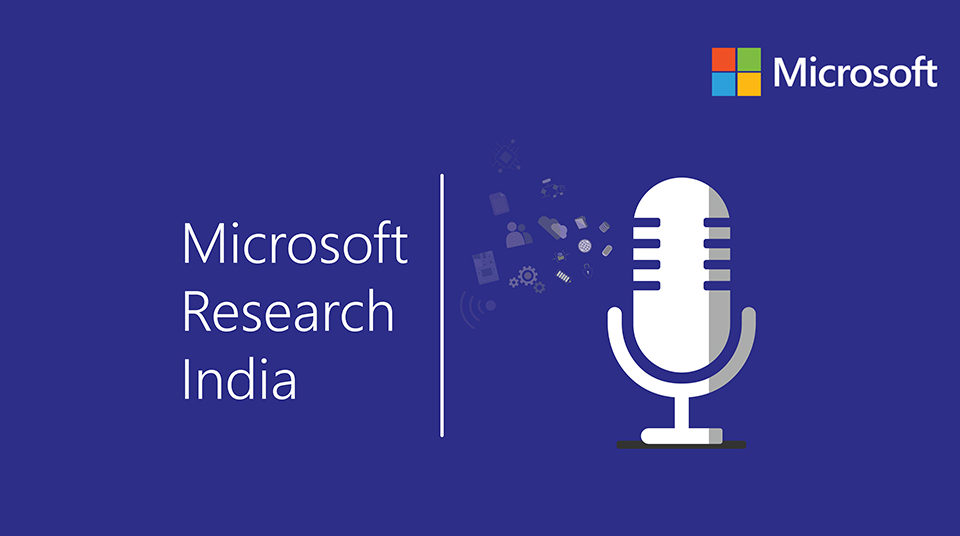The Microsoft Research India podcast brings to you conversations with some of the world’s leading experts whose research is impacting technology and society across the world.
 Episode 11 with Dr. Kaushik Murali and Dr. Mohit Jain: Collaborating to Develop a Low-cost Keratoconus Diagnostic Solution.
Episode 11 with Dr. Kaushik Murali and Dr. Mohit Jain: Collaborating to Develop a Low-cost Keratoconus Diagnostic Solution.
Keratoconus is a severe eye disease that affects the cornea, causing it to become weak and develop a conical bulge. Keratoconus, if undiagnosed and entreated, can lead to partial or complete blindness in people affected by it. However, the equipment needed to diagnose keratoconus is expensive and non-portable, which makes early detection of keratoconus inaccessible to large populations in low and middle income countries. This makes it a leading cause for partial or complete blindness amongst such populations. Doctors from Sankara Eye Hospital, Bengaluru and researchers from Microsoft Research India have been working together to develop SmartKC, a low-cost and portable diagnostic system that can enable early detection and mitigation of keratoconus. Join us as we speak to Dr. Kaushik Murali from Sankara Eye Hospital and Dr. Mohit Jain from Microsoft Research India.
Dr. Kaushik Murali, President Medical Administration, Quality & Education, Sankara Eye Foundation India (Sri Kanchi Kamakoti Medical Trust) which is among the largest structured community eye hospital network in India, (www.sankaraeye.com) with an objective of providing world class eye care with a social impact. A pediatric ophthalmologist, he has completed a General Management Program and is an alumnus of Insead. Dr. Kaushik has done a course on Strategic Management of Non Profits at the Harvard Business School. He has been certified in infection control, risk management for health care and digital disruption. He is a member of Scalabl, a global community promoting entrepreneurship. He is also a member of the Scientific Committee of Vision 2020, the Right to Sight India. He is currently involved in collaborative research projects among others with the University of Bonn & Microsoft.
Mohit Jain is a Senior Researcher in the Technology and Empowerment (TEM) group at Microsoft Research India. His research interests lie at the intersection of Human Computer Interaction and Artificial Intelligence. Currently, he focuses on developing end-to-end systems providing low-cost smartphone-based patient diagnostic solutions for critical diseases. Over the past decade, he has worked on technological solutions for the developing regions focusing on health, accessibility, education, sustainability, and agriculture. He received his Ph.D. in Computer Science & Engineering from the University of Washington, focusing on extending interactivity, accessibility and security of conversational systems. While pursuing his Ph.D., he also worked as a Senior Research Engineer in the Cognitive IoT team at IBM Research India. Prior to that, he graduated with a Masters in Computer Science from the University of Toronto, and a Bachelors in Information and Communication Technology from DA-IICT.
For more information about the SmartKC project, and for project related code, click here.
For more information about Microsoft Research India click here.
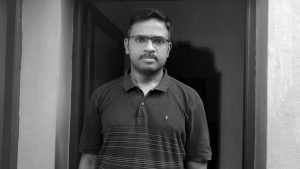 Episode 10 with Dr. Muthian Sivathanu and Sridhar Vedantham: Accelerating AI Innovation by Optimizing Infrastructure.
Episode 10 with Dr. Muthian Sivathanu and Sridhar Vedantham: Accelerating AI Innovation by Optimizing Infrastructure.
Artificial intelligence, Machine Learning, Deep Learning, and Deep Neural Networks are today critical to the success of many industries. But they are also extremely compute intensive and expensive to run in terms of both time and cost, and resource constraints can even slow down the pace of innovation. Join us as we speak to Muthian Sivathanu, Partner Research Manager at Microsoft Research India, about the work he and his colleagues are doing to enable optimal utilization of existing infrastructure to significantly reduce the cost of AI.
Muthian’s interests lie broadly in the space of large-scale distributed systems, storage, and systems for deep learning, blockchains, and information retrieval.
Prior to joining Microsoft Research, he worked at Google for about 10 years, with a large part of the work focused on building key infrastructure powering Google web search — in particular, the query engine for web search. Muthian obtained his Ph.D from University of Wisconsin Madison in 2005 in the area of file and storage systems, and a B.E. from CEG, Anna University, in 2000.
For more information about the Microsoft Research India click here.
 Episode 9 with Akshay Nambiar and Ajay Manchepalli: Dependable IoT- Making data from IoT devices dependable and trustworthy for good decision making
Episode 9 with Akshay Nambiar and Ajay Manchepalli: Dependable IoT- Making data from IoT devices dependable and trustworthy for good decision making
The Internet of Things has been around for a few years now and many businesses and organizations depend on data from these systems to make critical decisions. At the same time, it is also well recognized that this data- even up to 40% of it- can be spurious, and this obviously can have a tremendously negative impact on an organizations’ decision making. But is there a way to evaluate if the sensors in a network are actually working properly and that the data generated by them are above a defined quality threshold? Join us as we speak to Dr Akshay Nambi and Ajay Manchepalli, both from Microsoft Research India, about their innovative work on making sure that IoT data is dependable and verified, truly enabling organizations to make the right decisions.
Akshay Nambi is a Senior Researcher at Microsoft Research India. His research interests lie at the intersection of Systems and Technology for Emerging Markets broadly in the areas of AI, IoT, and Edge Computing. He is particularly interested in building affordable, reliable, and scalable IoT devices to address various societal challenges. His recent projects are focused on improving data quality in low-cost IoT sensors and enhancing performance of DNNs on resource-constrained edge devices. Previously, he spent two years at Microsoft Research as a post-doctoral scholar and he has completed his PhD from the Delft University of Technology (TUDelft) in the Netherlands.
Ajay Manchepalli, as a Research Program Manager, works with researchers across Microsoft Research India, bridging Research innovations to real-world scenarios. He received his Master’s degree in Computer Science from Temple University where he focused on Database Systems. After his Masters, Ajay spent his next 10 years shipping SQL Server products and managing their early adopter customer programs.
Click here for more information on the Dependable IoT project.
Click here to access the Verified Telemetry repository on GitHub.
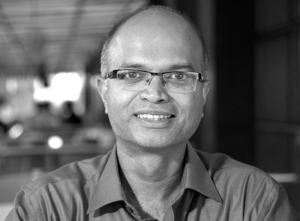 Episode 8 with Dr. Sriram Rajamani: Research @Microsoft Research India: interdisciplinary and impactful
Episode 8 with Dr. Sriram Rajamani: Research @Microsoft Research India: interdisciplinary and impactful
Microsoft Research India is constantly exploring how research can enable new technologies that positively impact the lives of people while also opening new frontiers in computer science and technology itself. In this podcast we speak to Dr. Sriram Rajamani, distinguished scientist and Managing Director of the Microsoft Research India Lab. We talk about some of the projects in the lab that are making fundamental changes to the computing at Internet scale, computing at the edge and the role he thinks technology should play in the future to ensure digital fairness and inclusion. Sriram also talks to us about a variety of things his own journey as a researcher, how the lab has changed from the time he joined it years ago, and his vision for the lab.
Sriram’s research interests are in designing, building and analyzing computer systems in a principled manner. Over the years he has worked on various topics including Hardware and Software Verification, Type Systems, Language Design, Distributed Systems, Security and Privacy. His current research interest is in combining Program Synthesis and Machine Learning.
Together with Tom Ball, he was awarded the CAV 2011 Award for “contributions to software model checking, specifically the development of the SLAM/SDV software model checker that successfully demonstrated computer-aided verification techniques on real programs.” Sriram was elected ACM Fellow in 2015 for contributions to software analysis and defect detection, and Fellow of Indian National Academy of Engineering in 2016.
Sriram was general chair for POPL 2015 in India, and was program Co-Chair for CAV 2005. He co-founded the Mysore Park Series, and the ISEC conference series in India. He serves on the CACM editorial board as co-chair for special regional sections, to bring computing innovations from around the world to CACM.
Sriram has a PhD from UC Berkeley, MS from University of Virginia and BEng from College of Engineering, Guindy, all with specialization in Computer Science. In 2020, he was named as a Distinguished Alumnus by College of Engineering, Guindy.
For more information about the Microsoft Research India click here.
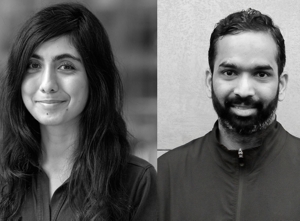 Episode 7 with Shruti Rijhwani and Dr. Vivek Seshadri: Helping young students build a career in research through the MSR India Research Fellow program
Episode 7 with Shruti Rijhwani and Dr. Vivek Seshadri: Helping young students build a career in research through the MSR India Research Fellow program
One of Microsoft Research India’s goals is to help strengthen the research ecosystem and encourage young students to look at research as a career. But it is not always easy for students to understand what research is all about and how to figure out if research is the right career for them. The Research Fellow program at Microsoft Research India enables bright young students to work on real-world research problems with top notch researchers across the research lifecycle, including ideation, implementation, evaluation, and deployment. Many of the students who have been part of the program have gone on to become researchers, engineers and entrepreneurs.
Today, we speak to Shruti Rijhwani, a graduate of MSR India’s Research Fellow program who is currently doing her PhD at the Carnegie Mellon University, and joining us is Dr. Vivek Seshadri, a researcher at MSR India who also heads the Research Fellow program at the lab.
Shruti was a research fellow at MSR India in 2016, working on natural language processing models for code-switched text.
She is currently PhD student at the Language Technologies Institute at Carnegie Mellon University. Stemming from her work at MSR India, she has continued research in multilingual NLP, with a focus on low-resource and endangered languages.
Vivek primarily works with the Technology for Emerging Markets group at Microsoft Research India. He received his bachelor’s degree in Computer Science from IIT Madras, and a Ph.D. in Computer Science from Carnegie Mellon University where he worked on problems related to Computer Architecture and Systems. After his Ph.D., Vivek decided to work on problems that directly impact people, particularly in developing economies like India. Vivek is also the Director for the Research Fellow program at MSR India.
For more information about the Research Fellow program, click here.
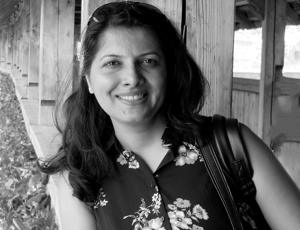 Episode 6 with Tanuja Ganu: Evaluating and validating research that aspires to societal impact in real world scenarios
Episode 6 with Tanuja Ganu: Evaluating and validating research that aspires to societal impact in real world scenarios
At Microsoft Research India, research focused on societal impact is typically a very interdisciplinary exercise that pulls together social scientists, technology experts and designers. But how does one evaluate or validate the actual impact of research in the real world? Today, we talk to Tanuja Ganu who manages the Societal Impact through Cloud and AI (or SCAI) group in MSR India. SCAI focuses on deploying research findings at scale in the real world to validate them, working with a wide variety of collaborators including academia, social enterprises and startups.
Tanuja is a Research SDE Manager at Microsoft Research, India. She is currently part of MSR’s new center for Societal impact through Cloud and Artificial Intelligence (SCAI). Prior to joining MSR, she was a Co-Founder and CTO of DataGlen Technologies, a B2B startup that focuses on AI for renewable energy and sustainability technologies. Prior to this, she has worked as Research Engineer at IBM Research, India.
Tanuja has completed MS in Computer Science (Machine Learning) from Indian Institute of Science (IISc, Bangalore). She has been recognized as MIT Technology Review’s Innovator Under 35 (MIT TR 35) in 2014 and IEEE Bangalore Woman Technologist of the Year in 2018. Her work was covered by top technical media (IEEE Spectrum, MIT Technology Review, CISCO Women Rock IT TV series, IBM Research blog and Innovation 26X26: 26 innovations by 26 IBM women).
Click here to go to the SCAI website.
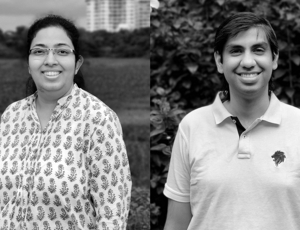 Episode 5 with Dr. Divya Gupta and Dr. Rahul Sharma: Making cryptography accessible, efficient, and scalable
Episode 5 with Dr. Divya Gupta and Dr. Rahul Sharma: Making cryptography accessible, efficient, and scalable
Ensuring security and privacy of data, both personal and institutional, is of paramount importance in today’s world where data itself is a highly precious commodity. Cryptography is a complex and specialized subject that not many people are familiar with, and developing and implementing cryptographic and security protocols such as Secure Multi-party Computation can be difficult and also add a lot of overhead to computational processes. But researchers at Microsoft Research have now been able to develop cryptographic protocols that are developer-friendly, efficient and that work at scale with acceptable impact on performance. Join us as we talk to Dr. Divya Gupta and Dr. Rahul Sharma about their work in making cryptography easy to use and deploy.
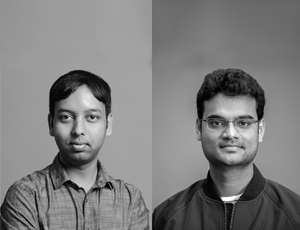 Episode 4with Chandra Madilla and Chetan Bansal: Can we make better software by using ML and AI techniques?
Episode 4with Chandra Madilla and Chetan Bansal: Can we make better software by using ML and AI techniques?
The process of software development is dramatically different today compared to even a few years ago. The shift to cloud computing has meant that companies need to develop and deploy software in ever shrinking timeframes while maintaining high quality of code. At the same time, developers can now get access to large amounts of data and telemetry from users. Is it possible for companies to use Machine Learning and Artificial Intelligence techniques to shorten the Software Development Life Cycle while ensuring production of robust, cloud-scale software? We talk about this and more with Chandra Madilla and Chetan Bansal, who are Research Software Development Engineers at Microsoft Research India.
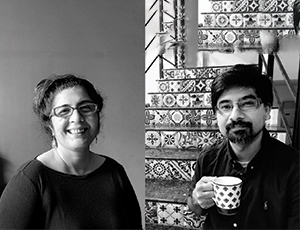 Episode 3 with Kalika Bali and Dr. Monojit Choudhury: What bhasha do you want to talk in?
Episode 3 with Kalika Bali and Dr. Monojit Choudhury: What bhasha do you want to talk in?
Many of us who speak multiple languages switch seamlessly between them in conversations and even mix multiple languages in one sentence. For us humans, this is something we do naturally, but it’s a nightmare for computing systems to understand mixed languages. On this podcast with Kalika Bali and Dr. Monojit Choudhury, we discuss codemixing and the challenges it poses, what makes codemixing so natural to people, some insights into the future of human-computer interaction and more.
Kalika Bali is a Principal Researcher at Microsoft Research India working broadly in the area of Speech and Language Technology especially in the use of linguistic models for building technology that offers a more natural Human-Computer as well as Computer-Mediated interactions, and technology for Low Resource Languages. She has studied linguistics and acoustic phonetics at JNU, New Delhi and the University of York, UK and believes that local language technology especially with speech interfaces, can help millions of people gain entry into a world that is till now almost inaccessible to them.
Dr. Monojit Choudhury is a Principal Researcher in Microsoft Research Lab India since 2007. His research spans many areas of Artificial Intelligence, cognitive science and linguistics. In particular, Dr. Choudhury has been working on technologies for low resource languages, code-switching (mixing of multiple languages in a single conversation), computational sociolinguistics and conversational AI. He has more than 100 publications in international conferences and refereed journals. Dr. Choudhury is an adjunct faculty at International Institute of Technology Hyderabad and Ashoka University. He also organizes the Panini Linguistics Olympiad for high school children in India and is the founding chair of the Asia-Pacific Linguistics Olympiad. Dr. Choudhury holds a B.Tech and PhD degree in Computer Science and Engineering from IIT Kharagpur.
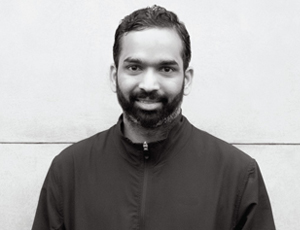 Episode 2 with Dr Vivek Seshadri: Enabling rural communities to participate in crowdsourcing
Episode 2 with Dr Vivek Seshadri: Enabling rural communities to participate in crowdsourcing
Dr Vivek Seshadri is a researcher at Microsoft Research India. A graduate of IIT Madras and a PhD holder from Carnegie Mellon University, his work primarily involves problems that directly impact people, particularly in developing economies like India.
In this podcast, we talk to Dr Seshadri about diverse topics, including his motivation to focus on research that can help underserved communities, and in particular, Project Karya, a new platform to provide digital work to rural communities.
While crowdsourcing platforms and the gig economy have been around for a while, they are not accessible to rural communities. Through Project Karya, Dr Seshadri is working to democratize access to crowdsourcing.
 Episode 1 with Dr Eric Horvitz: Potential and pitfalls of AI
Episode 1 with Dr Eric Horvitz: Potential and pitfalls of AI
Dr Eric Horvitz is a technical fellow at Microsoft, and is director of Microsoft Research Labs, including research centers in Redmond, Washington, Cambridge, Massachusetts, New York, New York in the US; Montreal, Canada; Cambridge, UK; and Bengaluru, India.
He is one of the world’s leaders in AI, and a thought leader in the use of AI in the complexity of the real world.
In this episode, we talk to Dr Horvitz about a wide range of topics, including his thought leadership in AI, his study of AI and its influence on society, the potential and pitfalls of AI, and how useful AI can be in a country like India.


